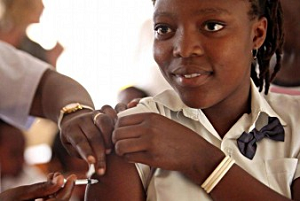 |
| GAVI Alliance wants to provide the HPV vaccine to a million girls by 2015.--Courtesy of GAVI Alliance |
A whopping 85% of cervical cancer deaths take place in developing countries where HPV vaccines from Merck ($MRK) and GlaxoSmithKline ($GSK) do not get distributed. The two companies, which make Gardasil and Cervarix, respectively, are now involved in pricing negotiations with the GAVI Alliance to curb that number by bringing low-cost HPV vaccines to some African and Asian countries.
The GAVI Alliance wants to use the shots to protect more than 180,000 girls in 8 countries--from Ghana to Laos--from cancers caused by human papillomavirus. Backed by the Bill & Melinda Gates Foundation, the World Health Organization, the World Bank and UNICEF, among others, the alliance received an offer from Merck to provide Gardasil at a deeply discounted $5 per dose. Three doses--the recommended regimen--would total $15. GAVI dubbed the 64% reduction on the current lowest public price "a good starting offer," Reuters reports.
The Centers for Disease Control and Prevention priced Gardasil at $92.47 per dose, while Cervarix comes in at $77.60 per dose.
GAVI hopes developing countries involved in the program will test systems needed to put in place a national HPV vaccine program. Each year, 275,000 women die of cervical cancer, a fatality rate higher than that of childbirth worldwide. That number could rise to 430,000 annually by 2030 if organizations and governments don't take action to protect more women from the disease. The alliance wants to immunize about a million girls in more than 20 countries by 2015 through pilot projects.
"I am very pleased that GAVI is standing firm in its commitment," Ian Frazer, creator of the HPV vaccine, said in a statement. "Today's announcement of country approvals for HPV pilot projects is another big step forward to ensuring that girls living in developing countries enjoy the same access to HPV vaccines as girls elsewhere in the world."
Gardasil and Cervarix both sit among the top-selling vaccines worldwide. Gardasil brought in an estimated $1.65 billion in 2012, while Cervarix tallied an estimated $753 million. But even in wealthy countries, vaccination rates are far below what they could be. In the United States, only a third of girls ages 13 to 17 received the full three-dose regimen by 2010, far below the 80% rate experts say is needed to significantly reduce the prevalence of infections.
- read the GAVI Alliance release
- here's more from Reuters